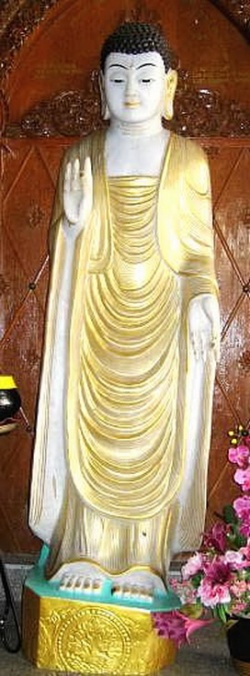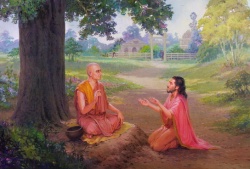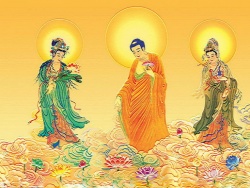Law of Cause and Effect 2
Without knowing the Law of Cause and Effect, you can’t understand Buddhism or the teachings of Master Shinran, the great reformer of Pure Land Buddhism.
To review, here are the three core principles:
Good causes bring good effects.
Bad causes bring bad effects.
Your own cause brings your own effect.
Our deeds or actions are like seeds. These seeds become causes.
Good Cause = Good Deed\Seed Good Seed = Good Result
Bad Cause = Bad Deed\Seed Bad Seed = Bad Result
Good Effect = Happiness / Favorable Situation
Bad Effect = Unhappiness / Unfavorable Situation
All humanity is living to obtain happiness. Politics, science, medicine, the arts, all of them exist to make our lives happier. The most important thing is how can we obtain happiness, and to know this we must understand the relationship of the cause and effect.
All effects have a cause. This is a true throughout the Three Worlds and Ten Directions. Without knowing the cause of happiness, we can’t enjoy that happiness as a result. We’ll be unfortunate if we are unaware of this principle.
The emphasis is placed on the Law of Cause and Effect as the sole determinant of our fate.
Result Cause
Good Fate\Destiny = Good Actions
Bad Fate\Destiny = Bad Actions
Own Fate\Destiny = Own Actions
When we have a good destiny we can accept this, but during a bad destiny we cannot. That’s when we believe “others’ cause, others’ effect.” I must be suffering from what others have done, we think. We blame the judge and jury for our crimes, but if this was true we’d be receiving the effect of their deeds. Buddhism teaches own cause, own effect. If you don’t understand this third point, you can’t grasp the other two principles either.
Even though we hear the Law of Cause and Effect, we still have this mentality of being persecuted during bad times. The thief who thinks the rope is the cause of his suffering is completely WRONG. The thief is suffering from his own doing. Once of aware of this, he has to reflect on what’s he done. He has to lament what he’s done.
We blame others all the time. It must have been that guy, we say.
But then we are just like the thief. We cannot understand this truth of the Three Worlds and the Ten Directions.
We wonder then intensely how this can be true in the cases of accidents or the victims of violent crimes, especially where children have been injured or killed. Why do they have to suffer? The effect of being hurt was caused by an attacker.
Is this still own cause, own effect? Yes, it is something they have done in their past, but we just can’t say that politely. Instead we go saying the cause was the murderer, and the victims did nothing. But the Law of Cause and Effect remains true regardless. When we hear about these tragedies in our lives and on the news, we just can’t accept it.
For example, let’s talk about the Akihabara Massacre which took place in Japan in June of 2008. A man drove a truck into a crowd killing three people and injuring two. He then exited the vehicle and began stabbing those around him. Using a survival knife, he killed four and injured eight others. But why did those victims have to be there at that place and time? If they were just a little further or had arrived an hour before, they would have been spared. Why did they have to be there at that place and that time?
The effect is that they were killed. Why did those 7 people have to suffer is the issue. The effect of being killed had to have had a cause. As we have learned in the Law of Cause and Effect, own cause, own effect. The result of being killed in the accident has to have been caused by something the victims had within them.
If you believe that the cause is the murderer, you still believe others cause own effect. So again what was the cause in this case? Own cause, own effect. This principle penetrates the Three Worlds and Ten Directions. The seed had to have been planted by the victims.
We say again, it can’t be like that. The victims did nothing wrong. But it is the same as the example of the thief and the rope. It is natural to hold a grudge against the murderer, so the point has to be made clearer.
Own cause, own effect is the truth. There is not even a single case for others’ cause own effect. Good causes bring good effects, Bad causes bring bad effects, Your own causes bring your own effect. Why does Master Shinran teach this then?
If being killed is the result, then the cause for this result must be something the victims had within themselves. The victims had cause to be at that site at that moment. Many visitors had passed through Akihabara in great numbers that day, totaling tens or even hundreds of thousands of people. There had to have been a seed the victims had to bring them to that exact place and time. If they didn’t have that cause, they wouldn’t have been there and others would have died instead.
It was a cause they had that in turn caused them to be killed. Others around them did not have that cause. It is because of own cause own effect. But then does the murderer have nothing to do with them?
The murder is the condition. An effect needs a combination of cause and condition. In this way, it could better be called the Law of Cause, Condition, and Effect. A cause itself can’t bring an effect. Only when a condition combines with a cause can effect arrive.
Usually we omit condition, but it is really the Law of Cause, Condition, and Effect. If the law could have intervened in time and brought justice, the effect wouldn’t have come about. This is why we must enforce the law in order to remove bad conditions from society.
The other people around did not have the cause of murder within them. Seven people had their cause and condition combined to have a sad effect. It is a cause they had. All of which happens to you comes from your own cause. When unfavorable results occur, we must reflect on our own doings. We must lament what we have done.
This must be understood deeply. A mass murder makes people think others’ cause, own effect. But why to only them? Only they received the result. The survivors’ causes must have been different. The murder was the condition.
There is more to come on this topic. In the next post, we will explore how past causes relate to our destiny and gain insight on the True Self.


